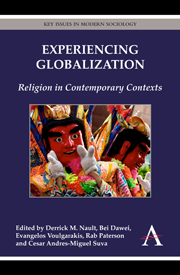Book contents
- Frontmatter
- Contents
- Preface
- Chapter 1 Introduction
- Part One Religion in Global and Transcultural Perspective
- Chapter 2 Adam Smith and the Neo-Calvinist Foundations of Globalization
- Chapter 3 Daniel Quinn on Religion: Saving the World through Anti-globalism?
- Chapter 4 Globalized Religion: The Vedic Sacrifice (Yajña) in Transcultural Public Spheres
- Part Two Comparative and Pluralistic Approaches
- Part Three Religion in Taiwan
- List of Contributors
Chapter 3 - Daniel Quinn on Religion: Saving the World through Anti-globalism?
from Part One - Religion in Global and Transcultural Perspective
Published online by Cambridge University Press: 05 May 2013
- Frontmatter
- Contents
- Preface
- Chapter 1 Introduction
- Part One Religion in Global and Transcultural Perspective
- Chapter 2 Adam Smith and the Neo-Calvinist Foundations of Globalization
- Chapter 3 Daniel Quinn on Religion: Saving the World through Anti-globalism?
- Chapter 4 Globalized Religion: The Vedic Sacrifice (Yajña) in Transcultural Public Spheres
- Part Two Comparative and Pluralistic Approaches
- Part Three Religion in Taiwan
- List of Contributors
Summary
Introduction
It is easy to celebrate globalization for its promise of an ever-advancing civilization in which barriers of geographic and social distance gradually fall away, and our various cultures recombine and blend together in ways that reflect the highest ideals of humanity. Such rosy projections face two basic types of critique. One is the dystopian prospect that exploitation and inequality will not wither away, but will persist or even accelerate, entrenching themselves in a despotic New World Order impervious to escape or revolt. The other is the threat that globalization will prove unsustainable—whether because of rising oil prices, climatic changes, human overpopulation or some other factor.
The suspicion that at some point humanity has taken a wrong turn resonates with religious tendencies towards conservatism, nostalgia and apocalyptic paranoia (or hope), as well as with environmentalist laments for the disappearance of the natural world. Bron Taylor's Dark Green Religion(2010, together with his website, www.brontaylor.com) discusses the spiritual dimensions of environmentalism, which “increasingly [fills] the cultural niches where traditional religious beliefs have come to be seen as less plausible” (Taylor 2010, x). While many religious groups express concern for the environment, few are “dark” green in the sense of regarding nature as sacred in its own right (Taylor 2010, ix, 10). “As environmental alarm has intensified,” Taylor writes, “this sort of religion has been rekindled, revitalized, invented, ecologized, localized, and globalized,” and as it spreads well beyond the environmentalist milieu, “may even inspire the emergence of a global, civic, earth religion” (Taylor 2010, x, 180).
- Type
- Chapter
- Information
- Experiencing GlobalizationReligion in Contemporary Contexts, pp. 43 - 58Publisher: Anthem PressPrint publication year: 2013



